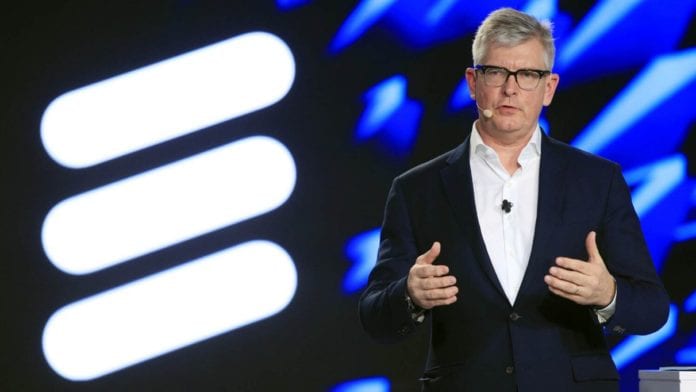In sum – what you need to know:
Punchy Q1 results – Ericsson saw net income surge 61% and gross margin jump 48.2% in the first quarter, driven by booming (possibly pre-tariff) network sales in North America – offsetting drops in every other region.
CEO shake-up looms – despite a good quarter, with key API-related wins, reports claim CEO Börje Ekholm faces the exit door as his relationship with major shareholders has soured over his Vonage splurge.
Enterprise shines – strong 20% growth in enterprise wireless sales, with headline private 5G deals with Jaguar Land Rover and SailGP, and strong traction in key verticals like manufacturing and public safety.
Ericsson saw its net income surge by 61 percent in the first quarter of 2025, finishing the period at SEK 4.217 billion, from SEK 2.613 billion in the year-ago period. Alongside, its net sales were up three percent to SEK 55.025 billion (from SEK 53.325 billion); its gross margin rose strongly, too – from 42.7 percent during the first three months of 2024 to 48.2 percent in 2025. The Swedish vendor put its showing in the quarter down to good network sales in North America, exclusively, offsetting declines in other market areas – including enterprise solutions, where enterprise wireless sales, including neutral-host and private networks, nevertheless jumped 20 percent.
Despite the performance, which has seen its share price rally upwards, its president, Börje Ekholm (pictured), is tipped to exit the company. Last week, Swedish financial publication EFN said the relationship between kholm and 80-percent co-owners Jacob Wallenberg and Fredrik Lundberg, from Investor AB and Industrivärden, that has gone “from friendly to strained to icy cold” (in translation). They are impatient with his acquisition strategy, it writes – and mainly with the company’s $6.2 billion long-game purchase of US software firm Vonage in 2021. As Light Reading has reported, their ire comes despite Ekholm’s “saving” Ericsson, since 2017, by righting its R&D spend, and driving its 5G wins.
Certainly, most of the upside in its first-quarter sales, forcing it convincingly into the black, is with network sales in North America, whether to public operators or private enterprises. Its EBITA profit was SEK 6.652 billion (adjusted to SEK 6.933 billion) in the quarter, up 36 percent from SEK 4.893 billion a year ago; its EBITA margin was 12.1 percent (12.6 percent), from 9.2 percent. Sales in the ‘Americas’ region constituted about a third of its total (SEK 20.8 billion out of SEK 55.025 billion), and rose 26 percent on the year-ago period (SEK 16.4 billion). Sales slipped in every other region, including in Latin America – offset in the Americas-count by an even sharper spike in North America.
Analysts quoted elsewhere put the firm’s results down to pre-tariff stockpiling in the US mobile industry, as well. Sales in the EMEA region slipped five percent to SEK 14.5 billion; sales in Southeast Asia, Oceania, and India (counted together) fell 16 percent to SEK 7.2 billion. Meanwhile, net sales and gross income from networks jumped six percent and 22 percent in the period to SEK 35.6 billion and SEK 18.1 billion; the same from associated cloud software and services were SEK 13 billion (down one percent) and SEK 5.1 billion (up by five percent). Net sales and gross income for enterprise products were SEK 5.9 billion (down one percent) and SEK 3.3 billion (up 17 percent.)
A real highlight, albeit a niche one still, was the company’s performance in the enterprise wireless segment, covering wireless wide-area network (WAN) and private-network and neutral-host systems, where reported sales grew by 20 percent year-on-year, driven by higher subscription and product sales in wireless WAN and “growth in private 5G and neutral host solutions”. It highlighted (again) its contract to supply Jaguar Land Rover’s production plant in the UK with private 5G for “vehicle production with applications such as vision systems, IoT, sensors, and production tools.”
Writing on LinkedIn, Åsa Tamsons, in charge of enterprise wireless solutions, reflected: “This is proof of how our enterprise solutions are driving transformational impact across key verticals like public safety, manufacturing, and retail. Our team continues to prioritise our customers’ and partners’ growth and success, even against an uncertain economic backdrop.” She highlighted its work with Jaguar Land Rover, and also SailGP and gold mining company Newmont Corporation.
Looking at the broader picture, Ekholm, possibly with his last financial review at the company, noted deals with Telstra in Asia Pacific for the “first high-performing programmable networks”, the big three US carriers for network API fraud detection, and “further Aduna partnerships” – all of which might be taken as a defence, of sorts, of his record at the helm, and indirectly of the Vonage purchase. He said: “We extended our technology leadership position further and are on track to offer a portfolio of 130 radios this year that support programmable networks.
“We announced the first Asia Pacific programmable network, including deployment of 5G Advanced, with Telstra. We remain confident of our strong position in mobile networks and expect enterprise to stabilise during 2025. In the evolving global trade landscape and macro volatility, we continue to focus on controlling what we can control and delivering to our customers. We are not immune, but we are resilient, with well diversified production close to the customer and the flexibility to adapt to changing conditions over time.”

